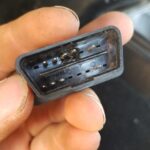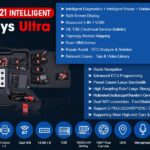Choosing the right OBD2 scanner can feel overwhelming, especially with the vast array of options available on the market. Whether you’re a seasoned mechanic or a car owner looking to understand your vehicle better, finding the best OBD2 scanner for your needs is crucial. This guide will break down what you need to consider when deciding What Obd2 Scanner To Buy, ensuring you make an informed decision and invest in a tool that truly benefits you.
Understanding OBD2 Scanners and Their Importance
Before diving into the specifics of what OBD2 scanner to buy, it’s essential to understand what these devices are and why they are so valuable. OBD2 (On-Board Diagnostics II) scanners are tools that connect to your vehicle’s OBD2 port – typically located under the dashboard – and access the car’s computer system. They allow you to:
- Read Diagnostic Trouble Codes (DTCs): Identify the source of the check engine light and other warning indicators.
- Clear Trouble Codes: Reset the check engine light after repairs are made.
- View Live Data: Monitor real-time data from various vehicle sensors (e.g., engine temperature, speed, RPM).
- Perform Emission Tests (I/M Readiness): Check if your vehicle is ready for emissions testing.
- Run Advanced Diagnostics (depending on the scanner): Some scanners offer more advanced features like bidirectional control, actuation tests, and system resets.
Having an OBD2 scanner empowers you to diagnose car problems yourself, saving time and money on unnecessary trips to the mechanic. For professionals, these tools are indispensable for efficient and accurate vehicle repairs.
Types of OBD2 Scanners: Finding the Right Fit
When considering what OBD2 scanner to buy, you’ll encounter different types, each catering to varying needs and budgets. Here’s a breakdown of common categories:
1. Basic OBD2 Code Readers
These are the most affordable and straightforward scanners. They are designed for basic tasks like reading and clearing trouble codes and viewing basic live data. Ideal for car owners who want a simple tool to understand check engine lights and perform basic diagnostics.
Pros:
- Affordable
- Easy to use
- Portable
Cons:
- Limited features
- May not offer advanced diagnostics
- Basic live data capabilities
2. Mid-Range OBD2 Scanners
Stepping up from basic readers, mid-range scanners offer more features and capabilities. They often include enhanced live data displays, graphing, and some advanced diagnostic functions like ABS/SRS diagnostics. These are suitable for DIY enthusiasts and car owners who want more in-depth information about their vehicle’s health.
Pros:
- More features than basic readers
- Enhanced live data and graphing
- Some advanced diagnostics (ABS/SRS)
Cons:
- Higher price point than basic readers
- May not be sufficient for professional use
3. Professional-Grade OBD2 Scanners
Professional scanners are the most advanced and feature-rich tools. They offer comprehensive diagnostics across all vehicle systems, bidirectional controls, actuation tests, key programming, and advanced service functions like oil reset, EPB reset, and more. These scanners are designed for professional mechanics and serious automotive enthusiasts who require in-depth diagnostic capabilities.
Pros:
- Comprehensive diagnostics for all systems
- Advanced features like bidirectional control and actuation tests
- Extensive service functions
- Often include updates and support
Cons:
- Most expensive type of scanner
- Can be complex to use for beginners
4. Wireless OBD2 Scanners (Bluetooth/Wi-Fi)
These scanners connect wirelessly to your smartphone, tablet, or laptop. They often work with OBD2 apps, offering user-friendly interfaces and data logging capabilities. Wireless scanners are convenient and versatile, appealing to both casual users and tech-savvy individuals.
Pros:
- Wireless connectivity
- User-friendly apps
- Data logging and sharing features
Cons:
- May rely on app compatibility
- Performance can depend on wireless connection stability
Key Features to Consider When Choosing an OBD2 Scanner
When deciding what OBD2 scanner to buy, consider these key features to ensure it meets your needs:
- Compatibility: Ensure the scanner is compatible with your vehicle’s make, model, and year. Most OBD2 scanners are universally compatible with vehicles manufactured after 1996 in the US (and similar standards in other regions), but always double-check.
- Functions: Determine the functions you need. Do you only need to read and clear codes, or do you require live data, advanced diagnostics, or service functions? Choose a scanner that offers the necessary features without overpaying for functionalities you won’t use.
- Ease of Use: Consider the user interface and ease of navigation. A scanner with an intuitive interface and clear instructions will save you time and frustration.
- Display: Scanners come with varying display types – from basic text displays to color screens with graphs. Choose a display that is easy to read in different lighting conditions.
- Update Capability: Regular updates ensure your scanner stays compatible with newer vehicles and has the latest diagnostic information. Check if the scanner offers free or paid updates and how often they are released.
- Brand Reputation and Support: Opt for reputable brands known for quality and reliability. Good customer support and warranty are also important considerations. Brands like Autel are well-regarded in the automotive diagnostic industry for their quality and comprehensive features.
Factors to Help You Decide What OBD2 Scanner to Buy
To further refine your search for what OBD2 scanner to buy, consider these factors:
- Your Budget: OBD2 scanners range in price from under $30 for basic readers to thousands of dollars for professional-grade tools. Set a budget and find the best scanner within your price range that meets your functional requirements.
- Your Skill Level: Are you a beginner, DIY enthusiast, or professional mechanic? Your skill level will influence the complexity and features you need in a scanner. Beginners might prefer simpler, more user-friendly scanners, while professionals will need advanced capabilities.
- Vehicle Type: Consider the type of vehicles you’ll be working on. Some scanners are better suited for specific makes or models, especially for advanced diagnostics. If you work with a wide range of vehicles, a scanner with broad vehicle coverage is essential.
- Portability: If you need to use the scanner in various locations, portability is important. Compact, handheld scanners are easier to carry and use in tight spaces.
- Connectivity: Decide if you prefer a wired scanner or a wireless option. Wireless scanners offer convenience but rely on a stable connection. Wired scanners are generally more reliable in terms of connection stability.
Exploring Autel OBD2 Scanners: A Leading Brand
When considering reputable brands for what OBD2 scanner to buy, Autel stands out as a leading manufacturer of automotive diagnostic tools. Autel scanners are known for their:
- Comprehensive Vehicle Coverage: Supporting a wide range of vehicle makes and models.
- Advanced Diagnostic Capabilities: Offering features like bidirectional control, active tests, and special functions.
- User-Friendly Interface: Designed for ease of use, even for complex diagnostics.
- Regular Updates: Providing frequent software updates to keep scanners current with the latest vehicles and diagnostic procedures.
- Robust Build Quality: Built to withstand the demands of professional use.
Alt: Autel MaxiSys Ultra EV advanced OBD2 scanner for electric vehicles.
Autel offers a range of scanners, from entry-level code readers to high-end professional diagnostic platforms like the MaxiSys series and MaxiCOM series. For example, the Autel MaxiSys Ultra EV, as featured in the original content, is a top-of-the-line tool designed for both conventional and electric vehicles, showcasing Autel’s commitment to innovation in automotive diagnostics.
Alt: Autel MaxiIM IM608 PRO II professional key programming OBD2 scanner.
For locksmith professionals, the Autel MaxiIM IM608 Pro II provides advanced key programming and diagnostic functions, highlighting Autel’s diverse product range catering to specialized needs.
Alt: Autel MaxiTPMS TS508WF dedicated TPMS OBD2 scanner tool.
Even for specific tasks like tire pressure monitoring systems (TPMS), Autel offers dedicated tools like the MaxiTPMS TS508WF, demonstrating their comprehensive approach to automotive diagnostics.
Conclusion: Making the Right OBD2 Scanner Choice
Choosing what OBD2 scanner to buy ultimately depends on your specific needs, budget, and technical expertise. By understanding the different types of scanners, key features, and factors to consider, you can make an informed decision and select a tool that empowers you to effectively diagnose and maintain your vehicles. Whether you opt for a basic code reader for simple tasks or a professional-grade scanner for comprehensive diagnostics, investing in the right OBD2 scanner is a valuable step for any car owner or automotive professional. Explore the options, compare features, and choose a scanner that best fits your requirements to unlock a deeper understanding of your vehicle’s health and performance.

